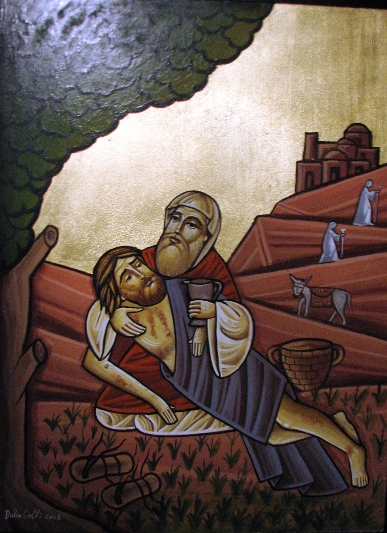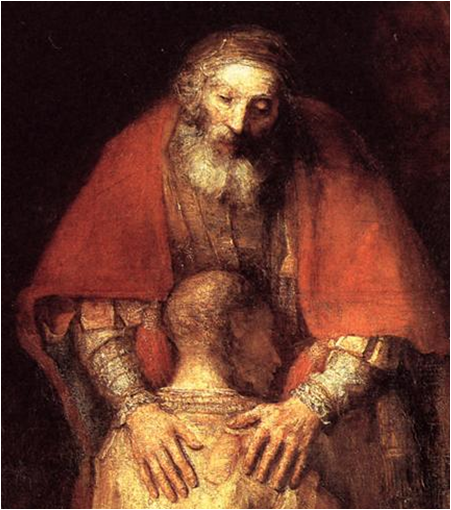The Th- Word
At some point or another, everyone has to deal with theology. It sounds scary (especially if you’ve heard of such words as dispensationalism and superlapsarian), but really it’s pretty simple— theology is just what we can say about God. Of course, Jesus then had a lot to say about theology. But whenever he wanted to get to the basics, to talk about what is most important to God and most important about our relationship with God, he gets back to these two commands: Love God and love your neighbor. That’s as basic as it gets.
Just Do It
But whenever any professor of theology or dogmatician tries to talk about theology, they do it on very different terms from Jesus. They always speak of “a doctrine statement” or a “confession of faith”. They emphasize what it is we believe about God. And that’s fine, as far as it goes. But whenever Jesus spoke about theology, he spoke about action and relationship. Either he is speaking about what God does for us or what we do for God. Even his most basic statement “God is spirit” is followed by a command, “And those who worship him must worship him in spirit and in truth.” (John 4: 24). According to Jesus, God isn’t just someone who sits in heaven— he’s a person who interacts with his people, “God with us.” And we aren’t to be people who observe God like we would a TV screen— we are to be active participants with our theology. If we just believe about God in our head, that isn’t enough— we’ve got to have faith in our hands and feet. And so Jesus talked about a faith that is enacted in obedience and an obedience that is informed by faith. Just like sex and conception, you can’t have one without the other.

Two Relationships of Theology
So when Jesus tells us about theology, he says that in every aspect of it, there are two relationships. Theology, he says, isn’t something that happens in our head, it is a connection between (at least) two beings. First, there is the relationship between the human and God. And this relationship is defined by “love”, so whatever else you can say about this relationship, it is supposed to be positive, and not simply duty-based. Yes, we already know that there is obedience involved— after all, Jesus gave us commands— but the relationship behind these commands aren’t just that of slave to master. Rather, we are to have a positive relationship with God, one in which we both benefit from the process.
The second relationship is that between human and human. This is what is really odd. I mean, Jesus is speaking about theology— what we can say about God— and the very thing that Jesus puts in there is our relationship with other people. What do other people have to do with God? Well, two things. First of all, God is very concerned about people. I mean, He made them, and he gave them the earth to rule (Psalm 8). And he claims to love them all (John 3: 16). Also, in this command, God is trying to help us PUT God into every relationship. Jesus is saying, “in your relationship with your neighbor, God is commanding it to be beneficial.” Thus, the relationship between human and human becomes theological, because God is forcing himself into that relationship (Ah, I know people like that…)
But what we need to realize in this basic of theology, is that Jesus is putting God and other human beings in everything we do religiously, theologically and spiritually. We cannot have a spirituality without God, according to Jesus. And we cannot have a faith without other people. If we claim to be doing something for God and it does not benefit others, then we do not have Jesus’ faith. Even so, if we attempt to do something for others and do not include God, then we do not have Jesus’ faith. Jesus’ theology is completely balanced between these two relationships— all has to do with both God and other people. To exclude one is to exclude true spirituality.
What is love of neighbor?
Well, we’d like to say more about loving God, but our teaching here by Jesus doesn’t give us any more than that it is love and it is God and well, that’s all that’s said. But the rest of the passage does talk quite a bit more about the love of neighbor. What exactly does it say?
1. Love of Neighbor isn’t exclusive
The professor wanted to exclude from the command everyone he didn’t like. Maybe he wanted to exclude heretics, or those who didn’t live in his country, or sinners or folks who did him wrong. But when Jesus asked his question, he made the professor answer that it was the Muslim— the heretic, the sinner, the foreigner, the persecutor— who was the neighbor. This means that if he was a neighbor, then EVERYONE is a neighbor, without exception. So the command involves every single human relationship we are in, without exception.
2. Love of Neighbor is demanded
Secondly, in Jesus’ story, he gave examples of two “good Christians” who didn’t follow the love of one’s neighbor. Thus, in Jesus’ story, although these people had a certain kind of faith, it wasn’t the kind that God was looking for. Their faith was practical and very pious, but it was wrong-headed. Because they thought that the love of God excluded them from the love of neighbor, then they were okay was NOT okay for God. God demands that the people who love Him also love those around them.
3. Love of Neighbor is compassion
The word that most defines the love of one’s neighbor is “compassion”. The Greek word for this is “splachna” which literally means “the feeling in your guts.” In other words, love is the gut-wrenching feeling you get when you see someone who is in need. To love someone is to recognize their need and to have compassion for it. No matter how evil they are, no matter how wrong-headed, compassion prevails in our attitude towards another.
4. Love of Neighbor is practical benefit
Lastly, when Jesus spoke about loving one’s neighbor, he was saying that the love was practical. The Muslim didn’t just pray a positive prayer for the man lying on the road. He didn’t just think good thoughts. Rather, he went out of his way to help him out in whatever way he could. He sacrificed his plans, his money and his vehicle to assist the stranger in need. Love doesn’t just stay in the heart (or the guts), but it gets out the pocketbook and gets dirty. Without being of practical benefit, it isn’t really love.
To have right faith is to present a benefit to everyone you meet
Kimes, Steven (2012-04-04). Long Live the Riff Raff: Jesus' Social Revolution (Kindle Location 175). . Kindle Edition.
















